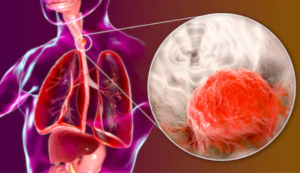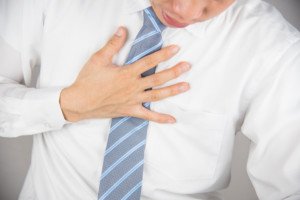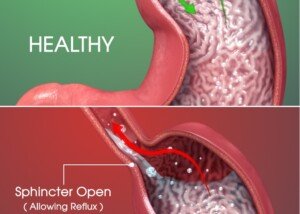Just what does it mean when “heartburn” is listed as a symptom of esophageal cancer?
Does this mean the tumor causes acid reflux?
Though the main symptom of esophageal cancer is the sensation that food is getting stuck on the way down to your stomach, heartburn almost always makes the standard symptom lists.
Heartburn is associated with acid reflux or GERD (gastroesophageal reflux disease).
When acid reflux occurs, acid from the stomach makes its way up the esophagus because the valve that joins these two organs doesn’t open and close properly.
This junction is called the LES: lower esophageal sphincter.
Unless food or beverage is entering the stomach, the LES is supposed to remain closed, to prevent acid from getting into the esophagus.
When acid gets through, a very common symptom is a burning in one’s chest: heartburn.
So if “heartburn” is on symptom lists for esophageal cancer, this suggests to the layperson that the tumor somehow causes acid to get into the esophagus – seemingly by weakening the LES.
When Esophageal Cancer Causes Heartburn
“Esophageal sensation is quite crude, and the esophagus has quite a limited repertoire of symptoms which it can produce,” begins Santosh Sanagapalli, MD, a consultant gastroenterologist, endoscopist and specialist in esophageal disorders.
“There is considerable overlap in symptoms between various esophageal conditions.
“Esophageal cancer does not cause acid reflux.”
Then why do symptom lists include heartburn?
That’s because heartburn is NOT a physiological action.
Heartburn refers to what the patient feels in the chest (or heart area). It’s a burning feeling, sometimes described as one’s heart being on fire when it’s bad enough. The usual cause is acid reflux.
But this descriptor is not about what’s actually happening inside when someone has esophageal cancer.
Like with GERD, “heartburn” refers to what the patient feels.
So when someone with esophageal cancer experiences “heartburn,” all that means is what they feel and has nothing to do with acid reflux.
“The symptoms caused by esophageal cancer may, in some situations, mimic acid reflux [as far as sensation],” says Dr. Sanagapalli.
“Acid reflux is usually the first condition diagnosed by many general practitioners when a patient presents with any esophageal symptoms, as it’s by far the most common cause.
“However, on careful questioning, one can usually ascertain that the symptoms of a patient with esophageal cancer are quite different.”
More Prominent Symptom of Esophageal Cancer

Shutterstock/Kateryna Kon
“The most typical symptom of patients with cancer is dysphagia, or a sensation that swallowed food or drink is not passing down easily,” says Dr. Sanagapalli.
The vexing issue is that what seems like dysphagia (difficulty swallowing) can also be caused by numerous other conditions including anxiety, GERD, esophageal motility problems, hiatal hernia, MS and LPR.
“Typically, dysphagia progressively gets worse as the cancer grows (patient often notices a deterioration over weeks to months).
“Dysphagia usually starts with difficulty swallowing solid foods only, but if the cancer grows very large, can eventually cause difficulty getting liquids down also.
“Confusion can arise amongst general practitioners — as dysphagia can sometimes be a symptom of acid reflux.
“Another way to help differentiate is determining whether the patient has lost weight – unintentional weight loss is very common with esophageal cancer, but should not happen in GERD.
“True heartburn (burning sensation behind the breastbone) is actually an uncommon symptom in esophageal cancer, but is the most common symptom of GERD (acid reflux).”
 Dr. Sanagapalli is a gastroenterologist and director of the Esophageal Disorders Center at St Vincent’s Hospital, Darlinghurst. He performs diagnostic and therapeutic endoscopic procedures, and enjoys providing comprehensive and holistic care to patients with a wide variety of disorders affecting the gastrointestinal tract.
Dr. Sanagapalli is a gastroenterologist and director of the Esophageal Disorders Center at St Vincent’s Hospital, Darlinghurst. He performs diagnostic and therapeutic endoscopic procedures, and enjoys providing comprehensive and holistic care to patients with a wide variety of disorders affecting the gastrointestinal tract.
 Lorra Garrick has been covering medical, fitness and cybersecurity topics for many years, having written thousands of articles for print magazines and websites, including as a ghostwriter. She’s also a former ACE-certified personal trainer.
Lorra Garrick has been covering medical, fitness and cybersecurity topics for many years, having written thousands of articles for print magazines and websites, including as a ghostwriter. She’s also a former ACE-certified personal trainer.
.










































